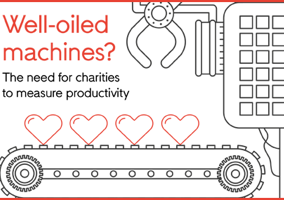The charity sector needs to review how it measures productivity, according to Andy Haldane, chief economist at the Bank of England and co-founder of Pro bono Economics.
Writing in the December edition of Civil Society Media's Charity Finance magazine, Haldane calls for an equivalent of the public sector’s Atkinson Report. In 2005, the government commissioned Professor Tony Atkinson to recommend improvements to how the public sector measured productivity.
Haldane says the resulting report “served as a call-to-arms for improving our measurement framework for public services and placing them on a more equal footing with the private sector.”
“What we need today is the equivalent of the Atkinson Review for the third sector: an authoritative account of what a coherent and comprehensive measurement framework for the charitable would look like and how to develop it, recognising the different conceptions of ‘value’ and ‘productivity’ this gives rise to,” he writes. “This, too, could serve as a call-to-arms, not only on better measurement but on better management, better financing and better policy in the sector. Not only does the sector need this; so too does society.”
Haldane argues that, while it is difficult for the sector as its outputs are “social rather than financial”, this is not a case of “economists wanting to know the price of everything, while at the same time understanding the value of nothing.”
He writes that the scarcity of societal resources means “that individuals, institutions and societies have difficult choices to make about where and how best to deploy these resources most effectively.”
“I think it is precisely because the social sector has found it difficult to measure its impact that it has struggled for resources, whether financial or human, and why it often gets too little policy attention,” Haldane says. “What is out of (statistical) sight is more likely to be out of (financiers’ and policymakers’) minds. It means the sector is suffering from under-investment of time and resources. And that needs to change, both in individual charities and across the sector as a whole, if the sector is to reach its societal potential.”
'Sky high' social productivity
Haldane says that the Official National Accounts records the economic value-added of the charitable sector at approximately £30bn, or slightly over 1 per cent of the UK’s annual GDP. However, he adds that his own calculations suggest this is an understatement.
“If you capture the entire social value created by the charitable sector, you find a contribution five, perhaps ten times as large,” he writes. “That is to say, the GDP-equivalent contribution of the charitable sector is far greater than the financial and human resources they deploy. Or, in econo-speak, the social productivity of the sector is sky-high.”
However, he adds that GDP-equivalent of monetary measures are “not the only, or necessarily the best, way of capturing the social value of charities.” “Measures of societal wellbeing or happiness” are likely to better “capture the true social value of an activity or intervention than recorded incomes.”
|
Related articles












